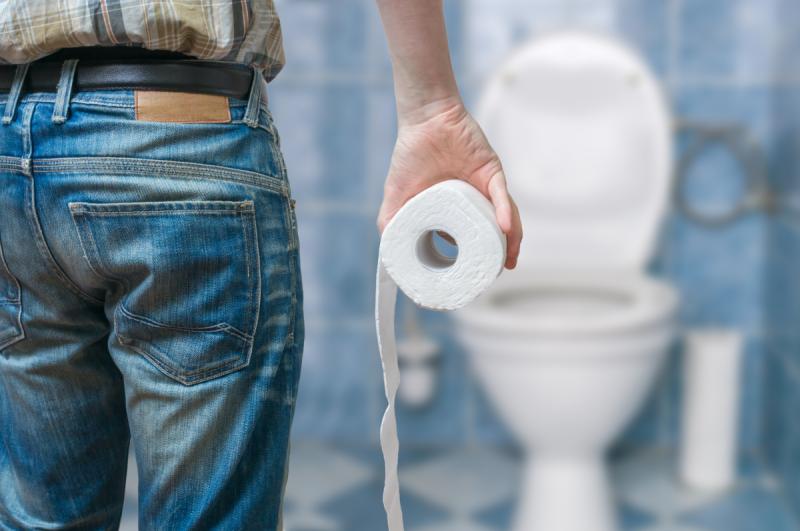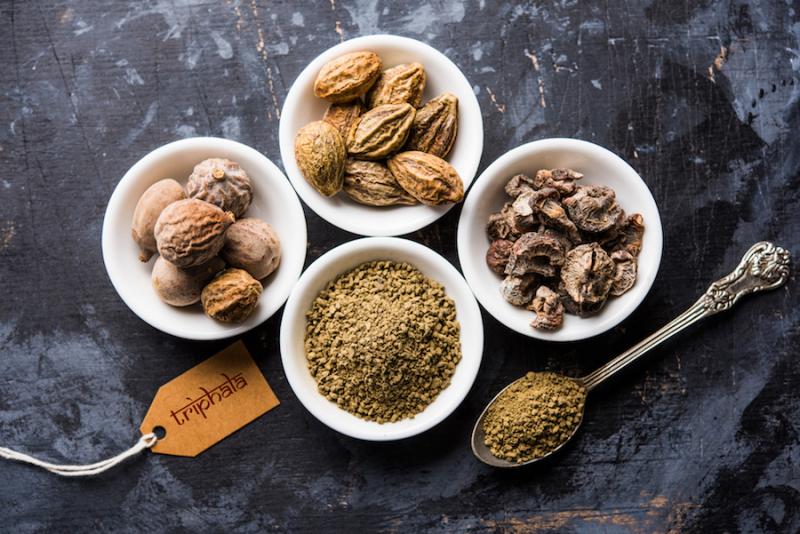
Some people think they're regular just because they have a bowel movement regularly every two or three days. I once met a man who had an elimination once every eight days. Let me assure you, that's not healthy.
From the time I was first introduced to herbal medicine until now, I've heard over and over again about the importance of regular elimination to health. Natural healers have long asserted that if waste material sits too long in the body, it poisons the system and destroys health. I know that regulating my own colon health was a key factor in eliminating my chronic sinus problems. Even now, if I don't keep myself regular I start to have congestion in my sinuses.
From One End to the Other
The time it takes food material to go from one end to the other is called colon transit time and it's an important factor in health. It should be less than 24 hours. For many Americans, it's around 48-72 hours. When waste material from digestion remains in the colon for more than 24 hours it allows irritants to be absorbed into the system instead of being promptly eliminated. The ill-effects of this have been called autointoxication—basically self-poisoning.
You can check your own colon transit time by eating some beets or drinking about 1/2 a cup of liquid chlorophyll. You then wait until the red color from the beets or the green color from the chlorophyll shows up in your stool. If your colon transit time is greater than 24 hours, you need to get your move on and speed things up.
Herbal Laxatives
Many people turn to herbal laxatives like cascara sagrada when they need to get things moving. Cascara is one of several herbs that contains anthraquinone glycosides. These compounds are yellow-brown dyes found in herbs like cascara, buckthorn, turkey rhubarb, the green part of the aloe vera leaf, butternut bark and senna. Plants that contain anthraquinone glycosides are helpful for occasional constipation. Acted upon by intestinal bacteria they increase peristalsis and inhibit water and electrolyte absorption in the intestines. The result is a laxative or purgative action.
Anthraquinone-bearing herbs are great for doing colon cleanses when combined with fiber and other herbs to tone the bowel, clean out the liver and lymphatics and aid kidney function. They are also important to use as part of parasite cleansing. They stimulate bile flow to help digest fats and can be helpful for increasing peristalsis to improve colon transit time in leaky gut and small intestinal bacterial overgrowth (SIBO).
Laxative Herbs Have Contraindications
However, anthraquinone laxatives do have contraindications. First, they should be used with caution with people with inflammatory bowel disorders as they can cause diarrhea. They should also be used with caution during pregnancy and while nursing. The pregnancy warning is erring on the side of caution, as I have used these herbs safely during pregnancy and so have many herbalists and midwives here in Utah. The caution with nursing is real, however, as the anthraquinones are passed into the breast milk and can cause diarrhea in infants.
Stimulant laxatives are also not a good choice for extremely weak and depleted people. Like anything which works by stimulation, they actually can exhaust the bowel to a certain degree, causing the colon muscle to become weaker, not stronger. The pioneer herbalist Samuel Thomson cautioned against the use of laxatives saying, “Physic [laxatives] I would by no means choose, to have you first or last to use; for if you use it much in course, it will disorder reinforce.” Also, in a discussion on Herbal Hall, a professional herbalist newsgroup, all the professional herbalists had similar concerns.
 |
| Tight Collarette |
Stimulant laxatives are also contraindicated if you tend to have a spastic bowel. As an iridologist, I've observed that people who have a tight or jagged collarette tend to become dependent on stimulant laxatives if they use them. the red lines in the picture on the right bracket the collarette, which is close to the pupil. The picture below that illustrates the jagged collarette which is not round but jagged, moving in towards the pupil and then sharply away from it, as shown by the red brackets.
People with either of these iris patterns are prone to bowel spasms or tension, which can be aggravated by stimulant laxatives leading to gripping (intestinal cramps) and intestinal discomfort. This cramping effect can be counteracted by the use of antispasmodic herbs. This is why a good lower bowel formula should contain herbs like lobelia that provide a relaxing effect to balance this potential negative reaction.
There's one more caution about using stimulant laxatives on a regular basis. I did mention that anthraquinones are a dye, didn't I? Well, taken over the long term they dye your colon—black. While there is no known harm in this, it does alarm many doctors when they do a colonoscopy.
 |
| Jagged Collarette |
The problem with stimulant laxatives like cascara sagrada, senna or other laxative herbs isn't that they are dangerous to use. They aren't. It's just that they are band-aids for the problem of constipation. They are symptom-relieving remedies that aren't fixing the real reasons why a person is constipated. So, just like taking pain-killers isn't a permanent solution to frequent headaches, laxatives aren't a permanent solution to frequent constipation problems.
One of my favorite quotes from Samuel Thomson is, “Remove the cause and the effect will cease.” If we want to really correct constipation, we need to first find the cause.
Causes and Real Solutions for Constipation
There are many reasons why a person might be constipated, but the first and most basic reason is that they aren't drinking enough water. Most laxatives work by holding more water in the stool to keep the stool softer and make passage easier.
Digestion requires a lot of water and one of the functions of the colon is to remove the water used in digestion so it can be recycled in the body. The more dehydrated you are, the more water the colon absorbs. Dehydration causes the stool to become dry and hard, which makes it difficult to eliminate. If you take a laxative, but you don't drink more water, you're just transferring your dehydration from the colon to other body parts. So the first thing you should try if you are constipated is drinking more water.
The Importance of Fiber
The second major cause of constipation is a lack of fiber in the diet. Fiber naturally holds onto the water in the stool, causing it to swell and bulk up. This puts pressure on the colon wall, which stimulates peristalsis naturally. So, the second thing you should try if you are constipated is adding fiber to your diet. The best way to do this is to eat more fresh fruits and vegetables, which contain both water and fiber.
If you take a fiber supplement, you have to drink more water. Because if you don't, the fiber won't have enough water to hold onto and the fiber can actually make your constipation problem worse.
The Role of Probiotics
 The next major cause of constipation is an imbalance in the microbiome. Some microbes will release compounds that make you more constipated and other compounds that give you diarrhea. In either case, you need to balance out your gut microbes to help your bowel work properly. To do this you need to make sure you have adequate stomach acid, as stomach acid helps control microbes in the small intestine. If you have a lot of gas, bloating and an acid stomach after eating, you may have low stomach acid. Try taking a betaine hydrochloric acid (HCl) supplement with meals. If you don't experience increased burning in your stomach, you probably need to increase your stomach acid.
The next major cause of constipation is an imbalance in the microbiome. Some microbes will release compounds that make you more constipated and other compounds that give you diarrhea. In either case, you need to balance out your gut microbes to help your bowel work properly. To do this you need to make sure you have adequate stomach acid, as stomach acid helps control microbes in the small intestine. If you have a lot of gas, bloating and an acid stomach after eating, you may have low stomach acid. Try taking a betaine hydrochloric acid (HCl) supplement with meals. If you don't experience increased burning in your stomach, you probably need to increase your stomach acid.
Besides taking betaine HCl, you can also use digestive bitters. Digestive bitters formulas should contain bitter and aromatic herbs like gentian, dandelion, orange peel, fennel, anise, and chamomile. These herbs need to be in a liquid form as the bitter taste is what helps to stimulate digestive secretions. Bitters also help to balance out the friendly flora. Other options for helping to reduce harmful bacteria in the gut and increase friendly ones include berberine, enteric-coated peppermint oil, cat's claw, pau d'arco, and goldenseal.
Of course, you can also benefit from supplementing your friendly flora with probiotics. The best way to do this is by eating fermented foods, such as organic yogurt or kefir, and naturally fermented vegetables, such as pickles or sauerkraut. You can make your own, of course, but most health food stores and even many grocery stores now carry these products. You can also take probiotic supplements.
Nutrients for a Healthy Bowel
Years ago I found a formula that contained magnesium oxide and vitamin C, which helped to tone the colon and improve elimination. Both magnesium and vitamin C have what is called bowel tolerance. That is, if you start taking either nutrient and gradually increase the dose, you eventually reach a point where they will cause diarrhea. This has led me to believe that people are often constipated because they lack these or other nutrients.
If you're constipated or you can't seem to go without taking stimulant laxatives, I recommend trying magnesium and vitamin C as nutrients to get your colon working again. Start by taking 200-400 milligrams of magnesium and 500-1000 milligrams of vitamin C each day. Every couple of days increase the amount of magnesium you take by another 200 milligrams and the amount of vitamin C by 500 milligrams. Drink plenty of water, of course.
Keep this up until you start to get loose stools. Back the dose off slightly and take that amount for a few weeks. This is a good way to get regular without laxatives.
Triphala
 Another way to tone up your colon and get it functioning better is to take Triphala. This is a very ancient Ayurvedic formula containing three fruits—haritaki, bibhitaki and amalaki. This blend has been used in India for thousands of years. It is a gentle laxative and a blood purifier that has tonic effects on the colon. This means that the formula not only helps the colon move, it actually tones the colon muscle and helps restore normal bowel function.
Another way to tone up your colon and get it functioning better is to take Triphala. This is a very ancient Ayurvedic formula containing three fruits—haritaki, bibhitaki and amalaki. This blend has been used in India for thousands of years. It is a gentle laxative and a blood purifier that has tonic effects on the colon. This means that the formula not only helps the colon move, it actually tones the colon muscle and helps restore normal bowel function.
Haritaki is a laxative with antispasmodic (muscle relaxing) properties. It has an astringent action, which helps with leaky gut and is a nervine. It is used in India for chronic constipation, nervousness, anxiety, and feelings of heaviness.
Amalaki is a mild laxative that has a small amount of anthraquinones. It is also cooling and anti-inflammatory. It reduces fevers, burning sensations, and alternating diarrhea and constipation. It is used to cool ulcers and helps to heal infections.
Finally, bidhitaki is a pungent herb that removes excess mucus. It is also antispasmodic and has been used for asthma, bronchial problems, and allergies.
In summary, this formula is a mild laxative and a great tonic for the colon, but it is much more. It is both antioxidant and anti-inflammatory. It enhances circulation, lowers blood pressure, and protects the heart. It also supports adrenal function, helps expel mucus, and has antiviral, antibacterial and anti-allergenic properties. It also improves liver function and digestion, including having hepatoprotective effects.
Triphala is indicated for constipation, indigestion, flatulence, poor appetite, digestive headaches, sinus congestion, joint pain, lethargy, and intestinal gas. Triphala is such a useful formula that there is a saying in India, “No mother? Do not worry if you have Triphala.”
Gentle, Toning Laxatives
You can combine Triphala with magnesium and other gentle colon toning herbs to create a Gentle Laxative Formula. One of those gentle colon toning herbs is yellow dock. Yellow dock also contains a very small amount of anthraquinones, but it is also anti-inflammatory and reduces intestinal irritation. My friend and fellow herbalist, Matthew Wood, uses it to cool intestinal irritation in cases of geographic tongue. It is one of those remedies that corrects both diarrhea and constipation.
The dose for a Gentle Laxative Formula varies but is usually 2-4 capsules once or twice daily. If you add extra vitamin C and magnesium, it will work even better. If you're taking stimulant laxatives regularly, you can start using the Gentle Laxative Formula while backing off the dose of the stimulant laxative.
I also make a very moistening fiber blend that makes a wonderful gentle laxative by mixing equal parts of psyllium hulls, freshly ground flax seeds and Triphala powder. I take this in the morning with apple juice. As long as you drink plenty of water, it will really help to soften and lubricate your stool, while toning your intestinal system.
Of course, the ultimate answer to staying regular is to eat healthily and drink plenty of water. You're not likely to be irregular if your diet consists primarily of fruits and vegetables. I realize that many people don't like fruits and vegetables, but I've found that if you clean out your colon, you'll actually develop a stronger taste for good food.
Steven's Articles
-

-
Reishi (Ganoderma) Mushroom
A TCM remedy for calming the shen (spirit), balancing…
-

-
Eucommia Bark
A superior tonic that promotes kidney, structural,…
January
-

-
Goldenthread, Phellodendron, and Yellow Root
Three herbal remedies containing the infection-fighting…
-

-
Teasel
A traditional herb for healing bones and joints…
-

-
Barberry and Healthy Personal Boundaries
A thorny shrub for fighting infections and supporting…
December
-

-
The Evidence for Berberine
A yellow alkaloid found in traditional infection-fighting…
-

-
The Sensible Use of Caffeinated Herbs
Kola nuts, guarana, and yerba mate and other herbs…
-

-
The Health Benefits and Problems with Coffee
This popular caffeinated beverage can be beneficial…
October
-

-
Understanding Caffeine & Cellular Adaptation
Preserving the power of caffeine's buzz and the…
September
-

-
Horseradish
A pungent spice for aiding protein metabolism…
-

-
Banaba or Crepe Myrtle
A beautiful tree from Southeast Asia whose leaves…
August
-

-
Monkeyflowers
Flower essences to help see ourselves more clearly…
-

-
Mariposa Lilies
Strengthening the bond between mother and child…
-

-
The Noble Bay Leaf
A common kitchen herb for aiding digestion and…
-

-
Epimedium: Horny Goat Weed
A circulatory stimulant and kidney yang tonic…

